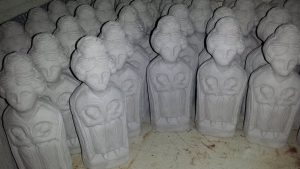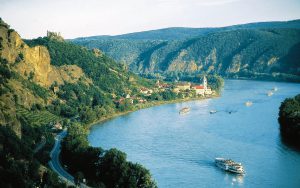The title of this post might seem a bit catchall, but it was inspired by the goddess Alauna and Boudina, who appear together on a couple of altars in Romanized Germany, while the similarly-named Alounae seem to be mother-goddesses from modern Austria.
As with Dea Vecana and Meduna, another pair of Germanic goddesses, one is warlike, while the other is more peaceful. The name Boudina comes from the Celtic root boudi-, victory, while Alauna means either nourisher or wanderer.
The two altars with their names come from Pantenburg, in the Rhineland-Palatinate state. The altars were dedicated by a private citizen, with the three names of Roman citizens. They read:
Bo]udinae / [e]t Alaunae / C(aius) Sextilius / Sollemnis (ref)
To Boundina and Alauna, Caius Sextilius Solemnis.Deo Voroi(o) / Boudinae / et Alaunae / C(aius) Sextilius / Sollemnis (ref)
To the God Voroio, Boudina and Alauna, Caius Sextilius Solemnis.
Presumably Solemnis wanted to honour the local deities. As for the god Voroius, an inscription from Trier mentions a Vorioni deo, presumably the same deity. The Pantenburg site included a sacred spring and a Jupiter-column as well as the two altars to the goddesses.
Alauna
According to the site Arbre Celtique, Alauna comes from *alanous, “nourisher” or else “wanderer, nomad”. She was probably a river-goddess. Given how important a river would be for its fresh water and fish as well as travel and commerce, both meanings would fit. The Celts thought so, since they gave the name to many rivers in France and Britain. (There’s a masculine form, Alaunus. More on him below.)
While she did not lend her name to any rivers in Germany, the Rhineland-Palatinate has two major rivers running through it, the Rhine and the Moselle, as well as many minor ones.
However, in Britain we have the two Alun rivers, one in Pembrokeshire and another tributary of the Dee river (the Afon Alyn) in Wales, and the Allen river in Scotland, called Alauna or Aluanos in Ptolemy’s Geography. (The river Aln, which gives Alnwick its name, is another candidate for Ptolemy’s river.) On the other side of the Channel, the Aulne river in Brittany was named Alauna or Alaunus.
Several Roman forts, like Alauna Silva near Axminster, Alauna near Castlesteads in Lancashire, another Alauna at Maryport in Wales and another near Alchester, probably took their names from nearby rivers. A Roman settlement at Valognes in Normandy was called Alauna or Alaunia.
Alauna fits into a pattern of Celtic river-goddesses like Matrona (Marne), Sequana (Seine), and Boand (Boyne). Noemi Beck connects her to other provider goddesses like Rosmerta, who looked after the welfare of their people. (This could explain pairing warlike goddesses and beneficent ones: one to defend, one to provide.)
Alounae
While Alauna comes from west-central Germany, the similarly-named Alounae come from the south-east, where Germany borders Austria. The Roman town of Bedaium, in the province of Noricum, lies near the Chiemsee, a large lake known as the Bavarian sea. Three large rivers flow into it, which could explain why someone would leave altars to the Alounae.
There are four inscriptions to the Alounae. They mention a god, Bedaius, who was probably the god of Bedaium, a Roman town. (Now Seebruck/Seeon.) The Roman fortress held a shrine to him, and several other inscriptions to him pair him with Jupiter Optimus Maximus.
Bedaio Aug(usto) / sacr(um) Aloun/ar(um) Setoni/us Maxim/ianus et Fir(mius?) Firmi/nianus IIvir(i) / Perpetuo et Cornel(iano) co(n)s(ulibus) CIL 03, 05572
Bedaio Aug(usto) / sacr(um) Alo(u)n(arum) / L(ucius) Cassius Lucullus / et C(aius) Vind(ius) Constans / [I]Ivir(i) Fusco / [II et Dextro co(n)s(ulibus)] CIL 03, 11778
Sacro(!) Aloun/arum Aug(ustarum) Nol() / Iu(v)enalis et Vig/rius Victorin(us) / Gordiano et Pom/peiano co(n)s(ulibus) votu/m sol(verunt) l(ibentes) m(erito) CIL 03, 11779
Bedaio Aug(usto) et Alounis Sacr(um) C(auis) Catius Secundianus Iivir Imp(eratore) Anotonin(o) II et Sacredote Co(n)s(ulibus) CIL 03, 05581
(The first three come from Chieming, the last from Seeon, all in the same area.) This area was home to the Alauni, a Celtic tribe who controlled the territory from the Inn river in Switzerland to the Chiemsee. Another theory is that the Alounae were their goddesses, like the many Matres and Matronae of other tribes, although the names are dissimilar.
Arbre Celtique points out that the inscriptions call the Alounae “sacred”, so they must have been important goddesses. Šašel Kos (171) thinks they were “nurtrices”, river-goddesses nourishing Bedaius. (The Roman Nutrices were, literally, wet-nurses.) This seems unlikely, although the altars to the Nutrices found there suggest a connection in people’s mind between the two groups of beneficient goddesses.

Roman mass production of Dea Nutrices using moulds. From Graham Taylor’s Twitter feed.
Boudina
If Alauna was a provider goddess, Boudina made sure that their people kept what they had. Her name means “Victory“, from the root word –boudi. The French goddess Boudiga and the German Matronae Boudunneae embodied the same idea in their names, while others like Brigantia, Nemetona and Cassibuoda were paired with the Roman Victoria to express the same idea.
In addition to the two altars dedicated to Alauna and Boudina, another from Liesenich, also in Germany, is dedicated to Boudina and several gods:
In h(onorem) d(omus) d(ivinae) Numin[i Aug(usti?)] / Marti Smertrio et [3] / Vindoridio Boud[3]/nae Cn(aeus) Domitius Cn(aei?) [fil(ius) (ref)
In honour of the divine house, the numen of Augustus, Mars Smertrius and […] Vindoridius Boud[..]na.
Mars Smertrius is a version of the Celtic god Smertrios, whose name comes from the same root as Rosmerta’s, making him a provider-god. As Mars Smertrios he would have merged the functions of our two goddesses, and was in turn the consort of Ancamna. Vindoridius is more obscure, although his name means “the white rider”.
Alaunus
The masculine form of the river-goddess is known from Notre-Dame des Anges in the south of France and Mannheim in Germany. (In Germany the god is named Alaunius.) The German inscription callis him Mercurio Alaunus, emphasizing the commercial traffic on rivers. (Mercury isn’t much of a nurturer, but he is the god of merchants.) Wikipedia says he is a god of healing and prophecy, although I can’t find any other references to this.
Alaunus was the reason I began this post. Wikipedia lists him as a Gaulish sun-god, and I wondered if Alauna could be a sun-goddess. There seems to be absolutely no evidence for either as a solar deity, but once again these lesser-known deities help to fill out the picture of Celtic religion.
References and Links
Noemi Beck on Alauna and Boudina
Roman Era Names on Alauna
Arbre Celtique on Alauna, Boudina, Alounae, Bediaus and Voroio (in French)
Deo Mercurio on Boudina and Voroio
Indo-European etymology (pp. 30-1, Alounae)
Alounae and other deities on the Chimsee in Noricum
paper by Marjeta Šašel Kos on the Alounae as Nutrices




Apparently there were many sacred wells in the post Roman Brythonic kingdoms of Deira, Elmet and Lindsey dedicated to the goddess Alauna, later re-dedicated to St Helen, but with some continuities of observance.
LikeLike
Thanks for passing that along.
LikeLike
I thought of Alauna as a goddess of rivers, but maybe I should broaden my definition.
LikeLike
Pingback: Why Is Tyr Such an Unimportant God? | We Are Star Stuff
Pingback: Icovellauna | We Are Star Stuff